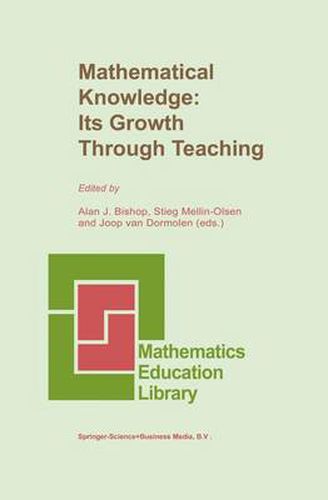Readings Newsletter
Become a Readings Member to make your shopping experience even easier.
Sign in or sign up for free!
You’re not far away from qualifying for FREE standard shipping within Australia
You’ve qualified for FREE standard shipping within Australia
The cart is loading…






This title is printed to order. This book may have been self-published. If so, we cannot guarantee the quality of the content. In the main most books will have gone through the editing process however some may not. We therefore suggest that you be aware of this before ordering this book. If in doubt check either the author or publisher’s details as we are unable to accept any returns unless they are faulty. Please contact us if you have any questions.
In the first BACOMET volume different perspectives on issues concerning teacher education in mathematics were presented (B. Christiansen, A. G. Howson and M. Otte, Perspectives on Mathematics Education, Reidel, Dordrecht, 1986). Underlying all of them was the fundamental problem area of the relationships between mathematical knowledge and the teaching and learning processes. The subsequent project BACOMET 2, whose outcomes are presented in this book, continued this work, especially by focusing on the genesis of mathematical knowledge in the classroom. The book developed over the period 1985-9 through several meetings, much discussion and considerable writing and redrafting. Our major concern was to try to analyse what we considered to be the most significant aspects of the relationships in order to enable mathematics educators to be better able to handle the kinds of complex issues facing all mathematics educators as we approach the end of the twentieth century. With access to mathematics education widening all the time, with a multi tude of new materials and resources being available each year, with complex cultural and social interactions creating a fluctuating context of education, with all manner of technology becoming more and more significant, and with both informal education (through media of different kinds) and non formal education (courses of training etc. ) growing apace, the nature of formal mathematical education is increasingly needing analysis.
$9.00 standard shipping within Australia
FREE standard shipping within Australia for orders over $100.00
Express & International shipping calculated at checkout
This title is printed to order. This book may have been self-published. If so, we cannot guarantee the quality of the content. In the main most books will have gone through the editing process however some may not. We therefore suggest that you be aware of this before ordering this book. If in doubt check either the author or publisher’s details as we are unable to accept any returns unless they are faulty. Please contact us if you have any questions.
In the first BACOMET volume different perspectives on issues concerning teacher education in mathematics were presented (B. Christiansen, A. G. Howson and M. Otte, Perspectives on Mathematics Education, Reidel, Dordrecht, 1986). Underlying all of them was the fundamental problem area of the relationships between mathematical knowledge and the teaching and learning processes. The subsequent project BACOMET 2, whose outcomes are presented in this book, continued this work, especially by focusing on the genesis of mathematical knowledge in the classroom. The book developed over the period 1985-9 through several meetings, much discussion and considerable writing and redrafting. Our major concern was to try to analyse what we considered to be the most significant aspects of the relationships in order to enable mathematics educators to be better able to handle the kinds of complex issues facing all mathematics educators as we approach the end of the twentieth century. With access to mathematics education widening all the time, with a multi tude of new materials and resources being available each year, with complex cultural and social interactions creating a fluctuating context of education, with all manner of technology becoming more and more significant, and with both informal education (through media of different kinds) and non formal education (courses of training etc. ) growing apace, the nature of formal mathematical education is increasingly needing analysis.